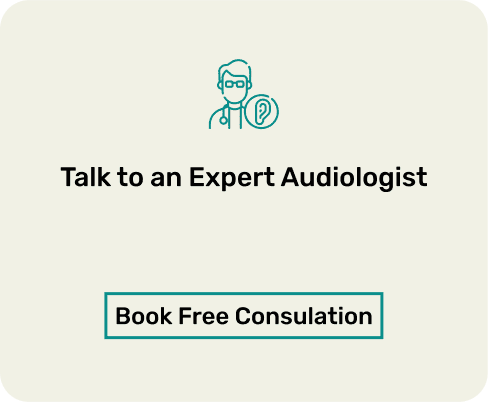Researching about hearing aids over the internet is fine, but should you ‘buy’ your hearing aids online?
A resounding NO!!
Here’s Why!
Looking For Hearing Aids? Don’t Buy Them Online. Get Free Consultation And Avail Offers Here!
[ninja-popup ID=1822] [/ninja-popup]
[/ninja-popup]
It is important to understand that hearing loss is a serious condition that needs the appropriate diagnosis from a certified expert.
The diagnosis is just the first step. Having identified the type and degree of hearing loss, the audiologist will suggest further treatment – either medical intervention or through the use of hearing aids or other hearing instruments. Choosing the right one amongst the various types of hearing aids, regular follow-ups with the audiologist for fitting and tuning the aid to suit your needs, upgrading the instrument periodically… all this makes buying and using hearing aids a very complex process! And, this is just one of the things you’d be compromising on if you choose to buy hearing aids online. Let’s take a look at all of them!
Here’s Why You Shouldn’t Buy Hearing Aids Online!
Contrary to getting hearing aids dispensed by a certified audiologist, buying hearing aids online can be quite a risky decision. Here’s why it’s best avoided.

1. How Do You Know The Right Product For You?
Identifying the right hearing aid for a client requires a deep understanding of the products and user requirement. This usually happens over the course of at least a half hour discussion where your hearing care professional understands makes a selection on the basis of your age, your listening requirements, your professional requirements, your cosmetic needs, your budget, phone and TV usage and what type (BTE/ ITC/ CIC/ RIC/ IIC) of instrument suits your hearing loss. If you buy hearing aids online, you compromise on these factors.
2. Programming Your Devices
Everyone has a graph with unique hearing thresholds (audiogram) and unique shape of the ear canal.
Hearing aids are programmed for your specific hearing loss and the requirements of your listening environment. Further, at the time of fitting a hearing aid specialist does special tests to ensure the comfort of your hearing instruments taking into account the size and volume of your ear canal.
Buying digital hearing aids online would be a complete waste of technology if not fitted appropriately by a hearing care professional.
3. After-Sales Services
Hearing aids are not over-the-counter products. They require multiple follow-up visits with your hearing care professional to fine-tune the hearing aids to your ever-changing loss. Typically instruments are used for 4-5 years before a change or upgrade, hence during this period you will build a good rapport with your professional who understands your needs.
You would also need help in maintaining (tube changes, wax guard changes, etc) that a hearing care professional would be needed for.
Hearing aids cannot be programmed by yourself at home. At least not until smart mobile phone friendly apps are introduced which enable you to manage your instruments from end-to-end. Currently, apps are available on Androids and iPhones for simply changing volume, programs and to some extent directionality. For everything else, you need your hearing care professional.
4. Warranty
All good hearing aid companies today clearly mention a disclaimer on their marketing materials and website that warranty would be considered void in case of hearing aids purchased online.
5. Cost
Buying a hearing aid from a professional audiology clinic usually includes the services for a period of time – this includes fitting of the instrument and at least a certain number of follow-on visits.
For instruments not bought through a professional, every time you visit a professional you would incur a fine-tuning or fitting charge. These paid visits will often be equal to or more than the cost you saved on buying the instruments online.
Further, the cost of repairs during the standard 2-year warranty period (which is not applicable to hearing aids bought online as mentioned in point 4) will also add to your out-of-pocket expenses.
6. Experience
The comfort and satisfaction from your hearing aids will be a function of habituation, expectations, counseling and definitely the quality of services of a known hearing care professional. Without any of these, you would be doing yourself a disservice in terms of your experience with your new hearing aids.
7. Hearing Aid Manufacturers Discourage It
The manufacturers themselves discourage it!
We think one should not need another explanation when the manufacturers themselves explicitly take this stand.
8. Peace of Mind
Lastly, but importantly, the peace of mind your hearing care professional will give you adds significantly to your experience with your hearing aids. Knowing that there is someone to deal with all your concerns and questions over the period of your usage gives one a peace of mind. This is especially important when buying high-tech products of which the client rarely has enough knowledge to manage.
It’s best to consult an audiologist, undergo the right diagnostic tests to understand the type and degree of hearing loss and use hearing aids or such other instruments recommended by the audiologist. Here are some of the tests conducted by audiologists to determine hearing loss.
Speak To A Hearing Specialist… Get Free Consultation And Avail Offers Here!
[ninja-popup ID=1822] [/ninja-popup]
[/ninja-popup]
Diagnosis And Assessment Of Hearing Loss
A full diagnostic test is needed to assess whether a hearing loss is permanent or temporary, and also to understand the exact location of the loss – in the inner ear, ear canal or the middle ear).
A full test includes an assessment of eardrum movement and also of hearing for speech. In fact, the test will also determine if the patient needs hearing aids at all, or the hearing loss can be treated medically.
Let’s take a look at some of the tests conducted for hearing loss assessment:

1. Pure Tone Audiometry (PTA)
Pure tone audiometry (PTA) is the key hearing test used to identify hearing threshold levels of an individual, enabling determination of the degree, type and configuration of a hearing loss. This includes two types of tests:
- Air Conduction: During an air conduction test, sounds are played into the person’s ears through earphones placed directly in the ear. This type of pure tone test gives you and the audiologist information about how all parts of the ear are working.
- Bone Conduction: During a bone conduction test, sounds are produced by a bone oscillator, which is placed on the person’s forehead.
2. Otoacoustic Emissions (OAE)
The hearing test is usually performed on newborn babies to detect deafness. It can also be used on adults to test for hearing loss. ‘Otoacoustic emissions’ refer to the sounds produced by the cochlea. These sounds can be used to test the function of the cochlea and other parts of the ear, including the auditory nerve.
3. Impedance Audiometry (Tympanometry)
This test is used to determine how the eardrum and middle ear are working. During a tympanometry test, a small earphone is placed in the ear canal and air pressure is gently changed.
Based on the diagnosis, the appropriate hearing instrument is identified and fitted. The hearing instruments are programmed and personalized by the audiologist to suit the individual’s requirements and hearing loss. Additionally, the audiologist will also provide other services such as:
- Fine tuning of hearing instruments
- After-sales service and repair
- Mould and shell production (earpieces made to comfortably fit the individual’s ear)
- Home visits for elderly/senior citizens
So, if you have a problem with your hearing, avoid opting for hearing aids online!
Contact one of Centre For Hearing’s RCI certified hearing care experts. We offer state-of-the-art diagnostic facilities and only the latest technology in hearing aids and other hearing instruments.
Get Free Consultation And Avail Offers Here!
[ninja-popup ID=1822] [/ninja-popup]
[/ninja-popup]




















